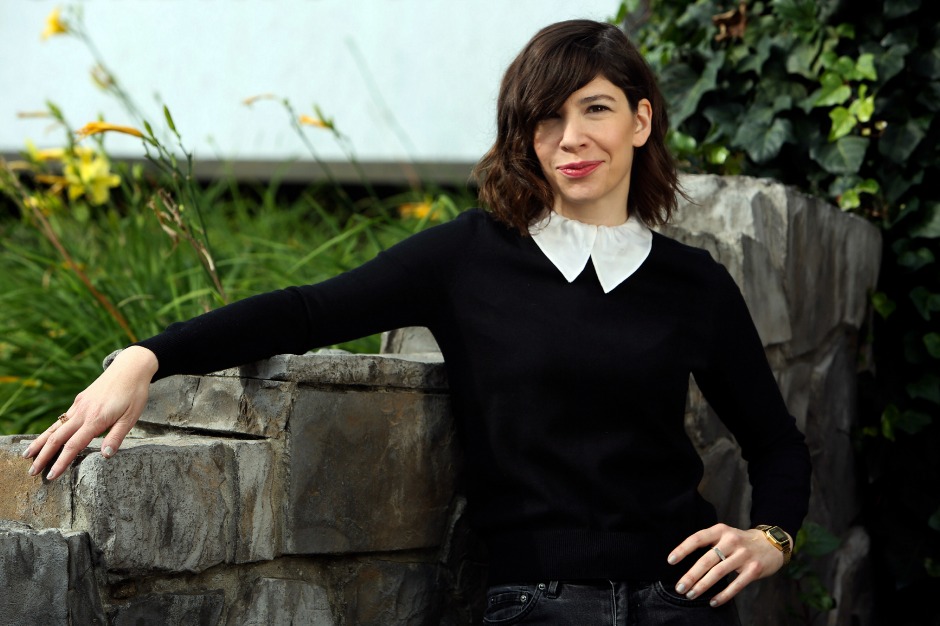Carrie Brownstein, in her New York hotel room, is working on a Saturday. But she’s had her coffee and is running on West Coast time, so she’s wide-eyed, clear-headed, and ready to dive into conversation with the same enthusiasm most reserve for a plate of eggs at noon on a weekend.
The Sleater-Kinney guitarist, writer, and Portlandia and Transparent actress has always been curiously eloquent. That quality has become obvious over the course of eight albums with bandmates Corin Tucker and Janet Weiss (including this year’s pulverizing comeback effort, No Cities to Love), then later on the inquisitive and conversant music zine Monitor Mix (R.I.P.), and now in her refreshingly forthright new memoir, Hunger Makes Me a Modern Girl, out on October 27 via Riverhead Books.
Brownstein’s book — which follows her early years in Redmond, Washington, moves through Sleater-Kinney’s initial run, and ends when she, Tucker, and Weiss parted ways in 2006 — was actually partially inspired by her blog entries, which ran from 2007 through 2010 on NPR.com. In her early writing, Brownstein frequently springboarded personal anecdotes (childhood camp songs, missing Portland, and her first concert — Madonna) into larger discussions. “I found that the writing that really engaged readers had my own story at the core of it,” she says. “It’s what made it unique from kind of a more outsider objective music writing. I incorporated my own experience into the narrative.”
Below, Brownstein takes SPIN further into the experience of writing her first book, how she regards her newfound cultural ubiquity, and what she said to fellow memoirist Grace Jones when they met this year at Barnes & Noble.
You’ve had an immense year: a Sleater-Kinney reunion, album, and tour, the fifth season of Portlandia, a reoccurring role on Transparent, and now the release of your memoir. Is a musical next?
[Laughs.] I don’t think so… I do have some new things on the horizon that I can’t talk about yet. But you know, I feel like it’s important to take a moment to enjoy what I’m doing and to also spend time alone and with my loved ones. I’m looking forward to a slight cessation of work, but I feel very fortunate for the year I’ve had. And you know, there’s still — as you said — some exciting things coming up. I’m really looking forward to getting out on the road with the book tour and talking to some really wonderful people. And then Sleater-Kinney are playing a slew of shows at the end of the year. I think that will be a really wonderful way of finishing off 2015.
Had you intended for these projects to overlap, or do you feel it was coincidental?
I think, timing wise, a lot of it was coincidental — it kind of coalesced at the same time. I don’t know if I necessarily would have planned these last couple of months starting with spring and right up till recently. I was shooting Transparent and Portlandia at the same time, and then starting to get into the press roll out of the book.
So there was just this flurry of events and trying to dedicate myself to one task at a time. I guess it wasn’t pre-planned, but it just kind of happened, that everything cohered simultaneously. And now it feels like the threads are starting to separate out, and I’m happy for that because I feel like I can focus my attention on one thing at a time, which is what I prefer. I think it allows me to be more grateful and appreciative of [every project] individually.
What made you feel that this was the right time to release a memoir?
Well, it really started with me writing for NPR a couple years ago after Sleater-Kinney ended. So, at that time I started thinking about writing a book, but it wasn’t until a couple years ago that I really decided to focus on something more of a memoir.
Did you prepare by reading any celebrity or musician memoirs?
I was inspired by Steve Martin’s Born Standing Up. He’s such a great writer. And in that book in particular, he focuses on the events and experiences of his childhood that led him up to Saturday Night Live. I liked that it was succinct narrative — through vignettes he [talks about] the moments that led him to that doorstep. For instance, with his family, with performance, and clowning in Disneyland, and stand-up.
So, using that as a structural model, I wanted to draw from different moments in my youth and childhood that took me from feeling like an outsider and on the periphery to a sense of belonging, and I knew that Sleater-Kinney was a better container for that story than, say, Portlandia. So that’s why the book doesn’t go all the way up through present tense, except for the epilogue, but that was kind of fortuitous. I didn’t know that Sleater-Kinney was going to get back together when I started the book.
You also spoke to Kim Gordon this year when you interviewed her for her book tour. What did you think of Girl in a Band?
I loved her book. I especially loved the part about California and how that landscape really informed her ideas about visual art and her family up in Oregon and her early experience in New York. She actually interviewed me recently for my book, and we talked a lot about the process. We’re friends, and before her book came out we talked a lot about the difficulties of writing. I mean, I think it’s always more arduous than one thinks.
My favorite part of Hunger was the way that you described music journalists’ “internalized sexism” when writing about Sleater-Kinney in the late ’90s and early ’00s. Do you feel that the media has progressed beyond these “common traps and assumptions” — as you worded it — today?
I think there’s an awareness of those kind of linguistic feelings and the ways that language is sexist or the ways that we will unfairly put a modifier or index or in front of somebody. At the same time, I think on occasion there’s actually much more amphibious ways of tearing somebody down or focusing too much on what somebody looks like. That occasionally happens more with women, whether it’s politicians or actors or CEOs. I think that fundamentally, we still live in a patriarchal and sexist society, so I think that that is still going to exist and it seems like it still does. I don’t feel like there’s been a huge shift. I think the awareness is there, and there are a lot of conversations, but I think it’s still relevant.
There’s also a great scene in the book where you’re 18 and auditioning to be the guitarist for Seattle punk band 7 Year Bitch. You describe yourself as so self-conscious and nervous while it was happening. Now, you’re, arguably, the music figure people approach nervously. How do you contend with that?
There are two illustrative examples: One is to remind myself that I view and sell myself first and foremost as a fan, and I continue to be a fan because I feel like fandom is what helps stave off cynicism. There’s an inherent openness and optimism and hopefulness and curiosity, and I think curiosity is such an important part of existing in the world.
When people flock to me, I try to recall how important it is to feel recognized and listened to, just even for a moment. I met Cindy Wilson from the B-52s for our Sleater-Kinney tour in Atlanta, and I posted a picture on my Instagram with kind of a long little paragraph about this very thing of. It’s the dorkiest photo of me — I mean my smile is almost, like, slipping off my face, it’s so big. I’m like, “Oh, my smile needed another face.” I think those are the things that keep me connected to what it means to be gracious and grateful for interactions.
Then the other night I went to see Grace Jones at Barnes & Noble —
Was that the signing where you could see through her shirt?
Yeah, it was. And she also showed up two hours late and did not do a reading, so she just did a signing. Anyway, to your point, in terms of how I deal with it: I shared this also on social media, because I feel like it helps people to realize that it’s okay to sort of fumble and be awkward during those moments because you feel like everything is riding on this five-second interaction.
When I walked down to Grace Jones to have my booked signed, at the end I said, “Good luck.” [Laughs.] Like, “Oh, yeah, good luck, Grace Jones, I hope everything works out for you.” I was just kicking myself afterwards, like thinking, “Good luck? Yeah, dude, I hope you have a successful career.” The nerdiest thing. But I shared that on Instagram, and the responses were I think a lot of people feeling validated, saying, “That’s what I felt when I met you, thanks for pointing out that you felt the same way.” I don’t gain anything from making myself seem separate from other people, so I guess that’s my way of going through the world. That doesn’t serve me, that doesn’t serve anyone else.
How do you stay level-headed when the media attention gets to be too much?
I feel like I live a pretty quiet life. I like to focus on work and friends and I love being in nature. I just took myself on a solo camping-hiking trip. I just think there are so many ways of staying grounded and of possessing humility that it’s really surprising to me when I see people sort of luxuriating in the world of celebrity.
I think most sane people focus on the work. I guess I just focus on the parts [of celebrity] that feel the most rewarding, which are the parts I’m grateful for: getting to collaborate with Fred Armisen, getting to work with Jill Soloway in Transparent, getting to write and play music with Janet and Corin. Those are the things that mean a lot to me. I try to tune a lot of the other things out.
Celebrity culture is… it’s not something that I’m attracted to. I guess I don’t think of myself in that way, but potentially other people do. I feel I’m at the far periphery of that.
Well, you’ve always struck me as a very self-aware person.
I am. [Laughs.]
And I can imagine how alone time would be vital to staying centered in the face of all this attention.
Yeah, I think so. And I didn’t use my phone or computer for a couple days [during my camping-hiking trip]. I think there’s just this vulturism that’s really bred and fostered and kind of reinforced. I really feel like social media — it’s like all these tiny stages that you put yourself on. And you come to rely on these likes and favorites and it’s this applause and this validation that you start to need. Then it’s like you don’t know how to soothe yourself, and I think it’s very pernicious. I think alone time is good to know how to be alone with your own thoughts. I think it just helps you kind of be a better, more grounded person.
There’s a difference between being lonely and being alone.
Yeah, and also I feel like it builds a sense of self confidence and a sureness that you know that you can venture out into experiences without the crutch of other people. Like, you’re not doing it because you feel lonely or isolated, but because it generates a new kind of experience.





